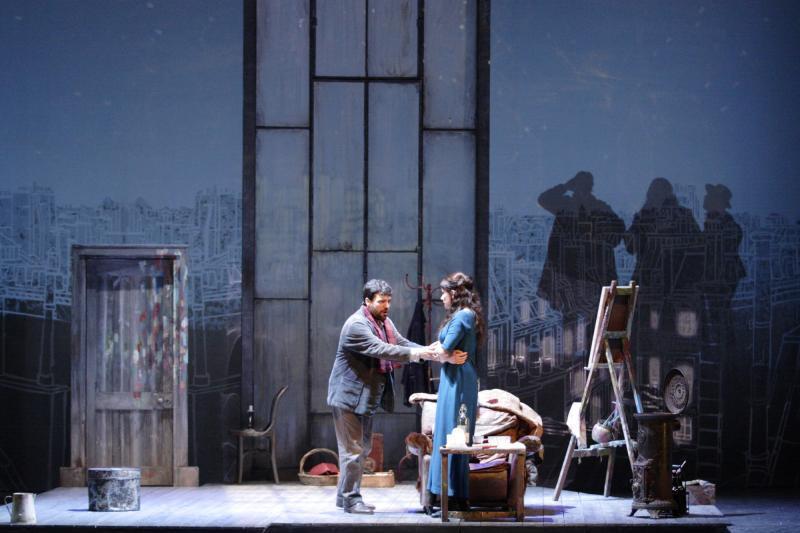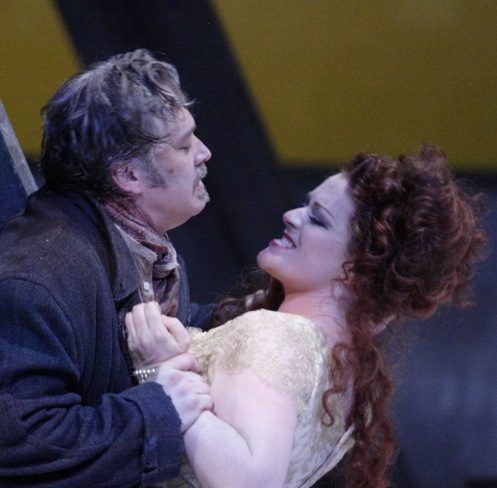La Bohème, Welsh National Opera | reviews, news & interviews
La Bohème, Welsh National Opera
La Bohème, Welsh National Opera
Touching new staging proves Puccini's mastery of dramatic and musical pacing

Of all Romantic operas, La Bohème is perhaps the one that responds best to what one might, for want of a better phrase, call straight theatrical treatment. It’s pure genre: no hidden meanings, no contemporary significance. “Scenes from the life”, as Murger called his book, now barely readable. Puccini’s opera, likewise, is short on continuity, long on atmosphere, very long on sentiment. Why would anyone bother with it?
Annabel Arden’s new production for WNO answers that question more than convincingly. She makes no great statements; we’re not lectured on art as redemption or disease as moral sickness. The action is not transported to the White House or the Welsh Assembly, Rodolfo is not reimagined (if that’s the right word) as Andrew Motion locked in an affair with Amy Winehouse. Instead we are in a Paris garret, perhaps a shade more recently than Murger, but not damagingly so; there is a big window, a chair and a stove. Momus is still in business. The marketers still need passports to get into the city at dawn. The artists starve and the snow falls. God’s in his heaven.
I don’t know any operatic act that’s so prodigal with snatches of marvellous ideas thrown away like casual conversation
I enjoyed this production and found it touching and very much to the point. Arden tweaks things here and there. Her Mimi blows her candle out deliberately (twice), which I think is a gloss on Puccini, though an entirely plausible one. The last act seems to be in a slightly different garret from the first – and maybe just, in its barrenness, there is the faintest hint of a symbolic point about the death of the heart, except that, here especially, the heart doesn’t die but somehow outlives the squalor and the seeming futility of young love. The designer, Stephen Brimson Lewis, comes up with a witty and effective adaptation of the front drop, into something like a Victorian Christmas card that opens out from a diamond-shaped centre aperture on to each scene. This both captures and defuses any sentimentality; I found it charming.
But needless to say the reason why the question is answered lies with the music. Puccini will always have his high-minded critics, but musicians know that few composers have had his mastery of the theatrical genre: his genius for dramatic pacing, his quality of ideas immaculately presented, his sheer expertise with the medium. Audiences have always known this as well, by the way, but shamefacedly, as if it were an unserious preference. In fact it shows excellent taste, though one might wish they could grow out of cheering “Che gelido manina” and (always slightly less spontaneously) “Mi chiamano Mimì”, as if it were part of the score.
Musetta’s waltz is a different case, because the sheer brilliance of the scene – the people, the children, the onstage band – draws us in as part of the crowd, and if we cheer then (we didn’t this time) we become temporary extras, part of the setting. I don’t know any operatic act that’s so prodigal with snatches of marvellous ideas thrown away like casual conversation, except possibly in Verdi’s Falstaff – a recent work that must have influenced Puccini. And how concise it all is! You could get most of La Bohème into one act of Tristan, WNO’s last offering. Yet Puccini is inconceivable without Wagner.
 Carlo Rizzi, the company’s former music director, has conducted Wagner here, but Puccini is his element. He has an Italian’s natural instinct for the lyrical flow combined with discreet symphonic texture that was more or less a Puccini invention. The orchestra play for him as if the music were in their veins. And if balance with the stage was mildly awry here and there, that was partly the director’s fault for upstaging her singers at tricky moments. This is a big theatre, while for singing Bohème the lyrical and the sprightly are more essential than the robust.
Carlo Rizzi, the company’s former music director, has conducted Wagner here, but Puccini is his element. He has an Italian’s natural instinct for the lyrical flow combined with discreet symphonic texture that was more or less a Puccini invention. The orchestra play for him as if the music were in their veins. And if balance with the stage was mildly awry here and there, that was partly the director’s fault for upstaging her singers at tricky moments. This is a big theatre, while for singing Bohème the lyrical and the sprightly are more essential than the robust.
Alex Vicens, the Rodolfo, is an occasional victim, with his somewhat pinched upper register and small physique, though both technically and emotionally he’s well on top of the music, and a sensitive, engaging actor. His love episodes with Anita Hartig’s Mimì are genuinely affecting, while never losing sight of their ephemeral quality of a one-night stand. No Liebestod in this garret, even if Rodolfo does let rip a tiny spot in C sharp minor over her corpse. Hartig, a Romanian soprano not heard here before, is something of a find, exquisitely tender onstage, with a lovely, easy top register, and needing only perhaps a touch more projection in the middle of the range. Theirs may be a shortlived passion, but it’s intensely felt, and here perfectly natural.
The support is strong. David Kempster (pictured above with Kate Valentine) is a fine, unapologetic Marcello, almost a second hero, and Kate Valentine makes a stylish Musetta, though on this opening night her waltz didn’t quite take off as it can and probably will. David Soar parts with Colline’s coat rather movingly (and uselessly: Mimì is dead by the time he comes back with the cash – somehow this is Bohème in a nutshell). Gary Griffiths is a witty, arty Schaunard. The WNO chorus sparkles as ever at the Café Momus, the inevitable mixture of weirdos, trannies, Parpignol the pedlar (Michael Clifton-Thompson) as a chimpanzee, but all straight as soon as they open their mouths.
- La Bohème at Wales Millennium Centre on 3, 6, 8, 9 June, and Birmingham Hippodrome on 13, 14, 15 June
Add comment
The future of Arts Journalism
You can stop theartsdesk.com closing!
We urgently need financing to survive. Our fundraising drive has thus far raised £49,000 but we need to reach £100,000 or we will be forced to close. Please contribute here: https://gofund.me/c3f6033d
And if you can forward this information to anyone who might assist, we’d be grateful.

Subscribe to theartsdesk.com
Thank you for continuing to read our work on theartsdesk.com. For unlimited access to every article in its entirety, including our archive of more than 15,000 pieces, we're asking for £5 per month or £40 per year. We feel it's a very good deal, and hope you do too.
To take a subscription now simply click here.
And if you're looking for that extra gift for a friend or family member, why not treat them to a theartsdesk.com gift subscription?
more Opera
 La bohème, Opera North review - still young at 32
Love and separation, ecstasy and heartbreak, in masterfully updated Puccini
La bohème, Opera North review - still young at 32
Love and separation, ecstasy and heartbreak, in masterfully updated Puccini
 Albert Herring, English National Opera review - a great comedy with depths fully realised
Britten’s delight was never made for the Coliseum, but it works on its first outing there
Albert Herring, English National Opera review - a great comedy with depths fully realised
Britten’s delight was never made for the Coliseum, but it works on its first outing there
 Carmen, English National Opera review - not quite dangerous
Hopes for Niamh O’Sullivan only partly fulfilled, though much good singing throughout
Carmen, English National Opera review - not quite dangerous
Hopes for Niamh O’Sullivan only partly fulfilled, though much good singing throughout
 Giustino, Linbury Theatre review - a stylish account of a slight opera
Gods, mortals and monsters do battle in Handel's charming drama
Giustino, Linbury Theatre review - a stylish account of a slight opera
Gods, mortals and monsters do battle in Handel's charming drama
 Susanna, Opera North review - hybrid staging of a Handel oratorio
Dance and signing complement outstanding singing in a story of virtue rewarded
Susanna, Opera North review - hybrid staging of a Handel oratorio
Dance and signing complement outstanding singing in a story of virtue rewarded
 Ariodante, Opéra Garnier, Paris review - a blast of Baroque beauty
A near-perfect night at the opera
Ariodante, Opéra Garnier, Paris review - a blast of Baroque beauty
A near-perfect night at the opera
 Cinderella/La Cenerentola, English National Opera review - the truth behind the tinsel
Appealing performances cut through hyperactive stagecraft
Cinderella/La Cenerentola, English National Opera review - the truth behind the tinsel
Appealing performances cut through hyperactive stagecraft
 Tosca, Royal Opera review - Ailyn Pérez steps in as the most vivid of divas
Jakub Hrůša’s multicoloured Puccini last night found a soprano to match
Tosca, Royal Opera review - Ailyn Pérez steps in as the most vivid of divas
Jakub Hrůša’s multicoloured Puccini last night found a soprano to match
 Tosca, Welsh National Opera review - a great company reduced to brilliance
The old warhorse made special by the basics
Tosca, Welsh National Opera review - a great company reduced to brilliance
The old warhorse made special by the basics
 BBC Proms: The Marriage of Figaro, Glyndebourne Festival review - merriment and menace
Strong Proms transfer for a robust and affecting show
BBC Proms: The Marriage of Figaro, Glyndebourne Festival review - merriment and menace
Strong Proms transfer for a robust and affecting show
 BBC Proms: Suor Angelica, LSO, Pappano review - earthly passion, heavenly grief
A Sister to remember blesses Puccini's convent tragedy
BBC Proms: Suor Angelica, LSO, Pappano review - earthly passion, heavenly grief
A Sister to remember blesses Puccini's convent tragedy
 Orpheus and Eurydice, Opera Queensland/SCO, Edinburgh International Festival 2025 review - dazzling, but distracting
Eye-popping acrobatics don’t always assist in Gluck’s quest for operatic truth
Orpheus and Eurydice, Opera Queensland/SCO, Edinburgh International Festival 2025 review - dazzling, but distracting
Eye-popping acrobatics don’t always assist in Gluck’s quest for operatic truth

Comments
It is 'Che gelidA manina',